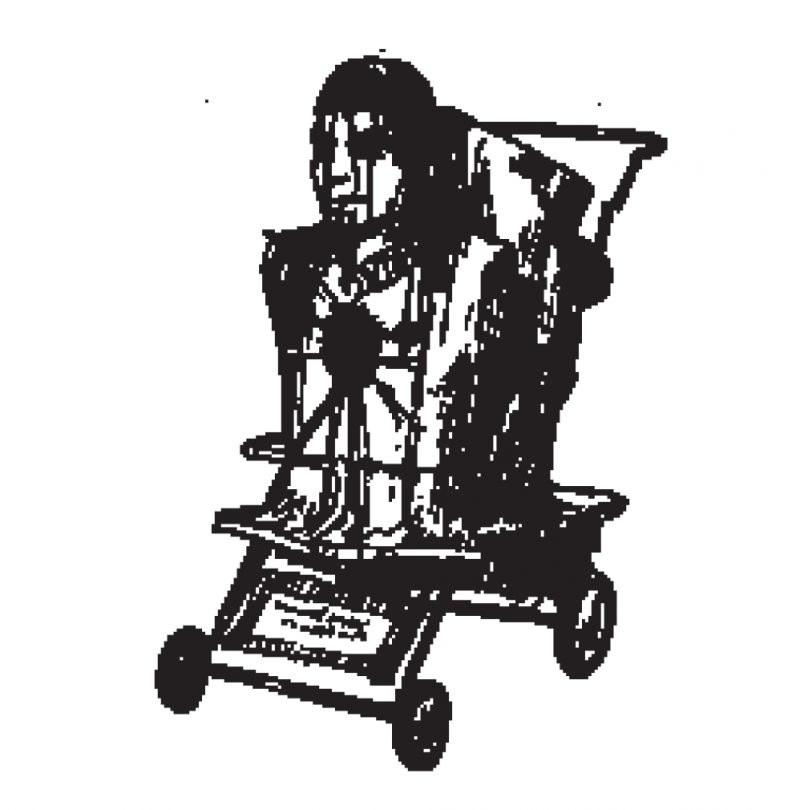I t’s coming on thirty years now—amazing. I was just out of college, still all long-haired and bushy, working out of the Oral History Program at UCLA, helping to process a big NEH-funded Group Portrait of the Los Angeles Art Scene, editing these long, long transcripts generated by multisession interviews with some of the leading figures in the history of Southern California art, and occasionally heading out to conduct some of the interviews myself. As was proving the case with one of the most important interviews in the whole series—or so we’d all been assured by the noted critic and sometime-academic Gerald Nordland, who was serving as the head consultant on the whole project. A five-day, ten-session summit with the redoubtable Ed Kienholz up at the compound along the shores of Lake Pend Oreille, outside Hope, Idaho, to which he’d repaired in the years after having turned the L.A. scene upsidedown and inside-out, almost managing to get the newly refurbished L.A. County Museum of Art closed down with its very first show, a hugely controversial midcareer retrospective featuring some of his most scandalous claptrap assemblage tableaux—renditions of, for instance, a seedy bordello (Roxy’s), a dead-end bar (The Beanery), and the steamy goings-on transpiring in the rear of a snub-nosed parked sedan (Back Seat Dodge ’38).
The L.A. Board of Supervisors had gotten itself worked up into paroxysms of righteous puritanical indignation at the horror, the horror, in particular, of that latter piece (the head supervisor, Warren Dorn, was getting all set to run for governor on the strength of his manifest fortitude as a protector of public decency).And they might well have succeeded in getting the whole thing shut down for real (“The rank indecency! The taxpayer dollars! The delicate sensibilities, for God’s sake, of the children, the little ones!”), had not Kienholz managed to subvert their entire scheme by secretly taping them as they undertook what they’d imagined to be a private preopening tour of the bordello installation and found themselves falling into dreamy reminiscence of the many happy hours they themselves had spent in institutions just like this one (“It’s so lifelike!”) out in Nevada in the days after the war. Suddenly, mysteriously to the public, all their objections evaporated. The show opened on schedule, to record crowds. And Dorn, previously the frontrunner, presently found himself losing the Republican gubernatorial primary to a two-bit actor named Ronald Reagan.
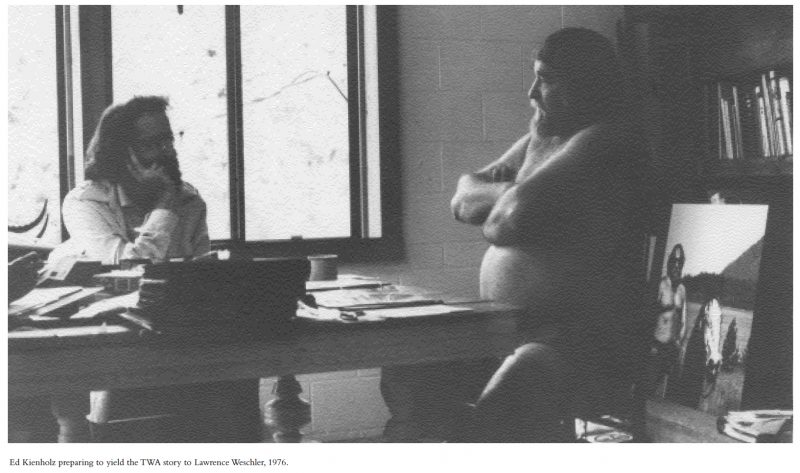
But I digress. The point is, within a few years of all that, Kienholz, in echt-Kienholz fashion, managed to cap the whole saga by hitching up with Nancy, the daughter of the town’s chief of police, Tom Reddin. And indeed, this, the last of his several marriages, proved the most enduring and without doubt the most productive (lasting clear through to his death in 1994). By the time, a few years after their marriage, that I was traveling up to Hope to interview him, it was clear that she had become a full partner in his artistic endeavors as well (a fact that he’d presently acknowledge by declaring her the coauthor of all the pieces emerging from their studio since 1972). On top of which, a fine photographer, she was busy documenting life around the compound: hence the wonderful picture she snapped one afternoon of the two of us in the midst of one of our interlocutorial impasses.
Because Kienholz was no easy interview. He loved toying with me and messing with my mind—expansive one minute, blockaded the next, enticing, entrapping, funny, scary, relaxed, dubious, abrupt, peremptory, all generous and then all slammed shut. Much, it began to occur to me, like his art: he kept you on your toes. Sometimes he’d reach down, grab you up by your lapels and positively slam dunk you back onto your toes.
Anyway, before going up, everybody had been telling me to make sure to get Ed to tell me the story about TWA and the Tiffany lamp.“Whatever you do,” his fellow artist Robert Irwin insisted, dropping me off at the airport,“get him to tell you that damn Tiffany lamp story.”And I’d been trying.Several times over the previous four days I’d raised the subject and each time Ed had batted it away. But this was it, this was the last time, our last session was coming to an end; so, forlornly, I tried once more.
And this is what happened:
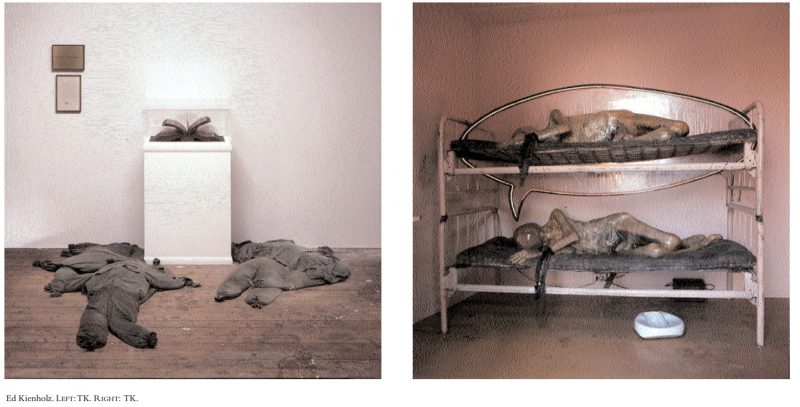
LAWRENCE WESCHLER: Okay, this is it. This is my last push, your last chance to tell me the TWA story.
ED KIENHOLZ: Well, you had to start off wrong, you see. It’s not going to work. I would have to be inspired.
LW: Well, okay. Bzzzz…
EK: Not by a mosquito. [Laughter]
LW: Should I do my imitation of a Tiffany lamp?
EK: No. Shit that’s a long story. It’s a stupid story. You don’t want to hear about it.
LW: Try me.
EK: Oh, Bob Irwin says you got to get the story. Well, what does he know? I’ll tell you off tape, and then you can relate it back.
LW: Oh, no. Come on. Tell me now.
EK: Ahh. Tell you what I’ll do. I’ll make you a trade. You want that story pretty bad, right? Okay, what are you going to do for me in exchange?
LW: I’ll give you a book on Indians [Ralph K.Andrist’s The Long Death].
EK: Well. That’s a good beginning. Now, what else?
LW: I’ll give you Peter Plagens’ book [Sunshine Muse] with all the things about you torn out. [Laughter]
EK: No, I’d rather not have that. I mean, there has to be something. What can it be? I mean, it’s a hell of a story.
LW: I made you an offer. What do you want?
EK: Well I think the Indian book is terrific. That’s a good trade. Now we got to get into… That’s the preliminary; that’s the gesture to open the negotiations. All right. The story and the Indian book; now we’re talking. Now, what are you going to do for me? I mean it has to be something stupendous, super, colossal.
LW: I’ll leave. [Laughter]
EK: No, you don’t have to leave. I mean, that’s not an inducement. How about an ink print of the back of Gerry Nordland’s head?
LW: Okay.
EK: You can get that for me? That means that you brayer the back of his head with printer’s ink, and you take a print from his head, right? You’re going to do that for me? [Laughter]
LW: Do you have an alternate? [Laughter]
EK: Oh, you wouldn’t like this story. [Laughter] It’s not important.
LW: So there you were with this Tiffany lamp…
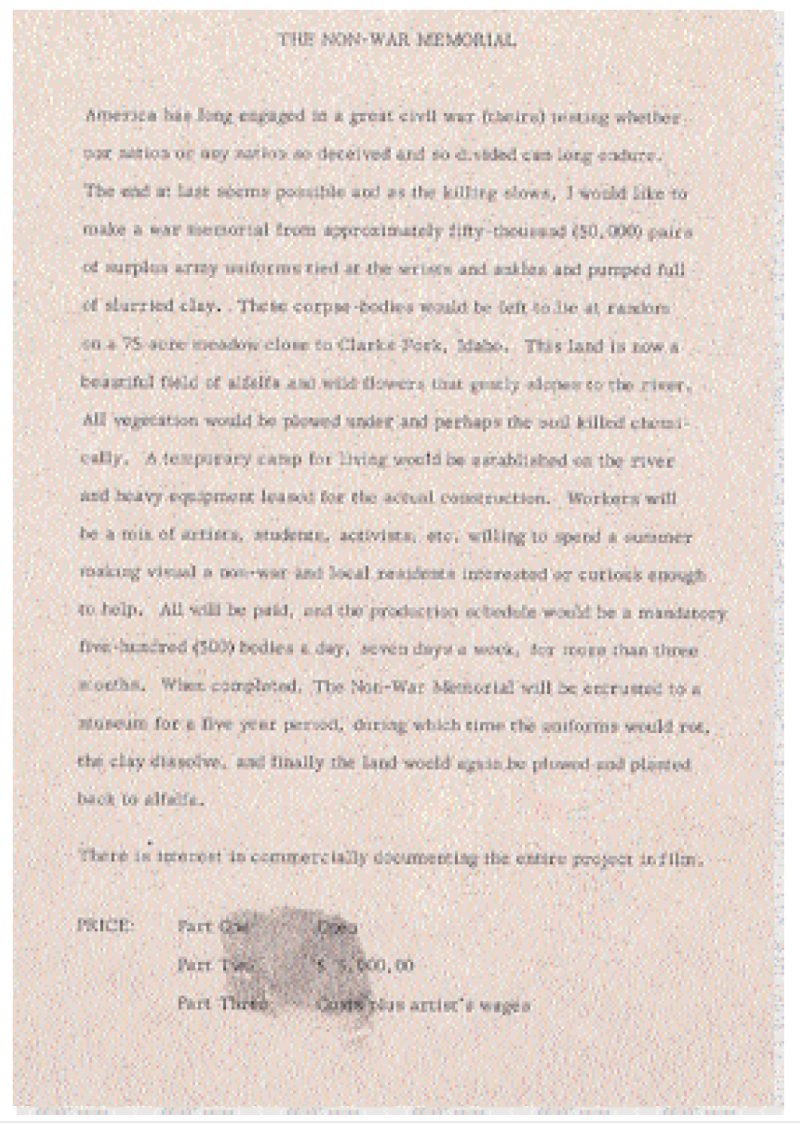
EK: Now, here you are with Gerry Nordland… [Laughter] There must be something really stupendous that can be accomplished here. You’re inventive. You should be able to…
LW: I’ve given you some inventions.
EK: Like you could do something stupid like do dishes for a week, but I mean, that’s foolish. It should be something with a little flair to it. I think maybe a print of the back of Gerry Nordland’s head would be good—I mean, not in his face and eyes, just the back.
LW: I mean, how? You want this with ink? Could it be some other medium?
EK: With some printer’s ink.
LW: How about just kind of dusted in a way that he wouldn’t realize that it was going on?
EK: No, no, no. He’d have to be a willing participant. But he’s also interested in having all of this isn’t he? Well, Gerry Nordland will probably go along with it. But you have to say that you’ll do it for me.
LW: I’ll do it for you…
EK: When?
LW: When I get back, I’ll do it for you. I’ll play this for Gerry, and he’ll realize the importance of the project, and…
EK: All right. Then I’ll take the print, and I’ll put it in a piece someplace, to confound the eventual student who listens to this shit and believes it. He’ll say, “Why, that’s a print of Gerry Nordland’s head; and that was because, and I remember, and I heard that, and I read…” And then they’ll participate in all this nonsense.
Well, there I was with a Tiffany lamp in West Virginia. Some friend of Lyn’s gave it to her. It was from a beautiful old house outside of Washington. We went out there quail hunting, or bobwhite hunting. And in the closet there was a lamp that had been originally gas and was converted over to electricity. It was a mess of spires and spikes and casts of cupids and whatever—I mean, it was just ornate, crazy. And this very good friend of Lyn’s wanted to give it to her. And also there was a Tiffany lampshade, not related to that lamp, but a signed Tiffany lampshade. “Take this,” she says. “I’ll never take it out of the closet. It’s been here—I don’t like it.” So we took it and went back to the hotel room. I thought, “I’ll have to get it back to Los Angeles, so I’ll pack it.” So I went down to a grocery store, and I bought a couple of cardboard boxes and a roll of masking tape and some paper. I went back to the hotel, and I made a box that was not only the proper size for the lampshade, but it was also contoured to fit the diagonal part of the lampshade. I packed it very well and sealed it all with tape.
So we went out to Dulles International on Thanksgiving morning, whenever this was. There was some guy there at the TWA counter who should have been home with his family eating turkey because he was just in a really rotten mood. And he said, “You can’t hand-carry that.” I said, “Well, it will go under the seat.” He said, “No, it won’t.” I said, “Well then, prove it.” You know, they usually had a trial seat, a thing that had the dimensions. Well, he couldn’t find the trial thing, or he didn’t want to, or whatever. He said ,“Look if you want to take it on the plane, you’ve got to check it through.” I said, “You’ll break it.” He said, “Naw, we won’t break it.” I said, “All right, I want it insured.” He said, “Fine.” He threw it on something, and he gave me a little receipt. And we got on the plane and flew to Los Angeles. There were two other people on the plane. (If you ever want to travel, by the way, go on a holiday like Thanksgiving or Christmas day. It’s terrific. There’s nobody on the plane—not even a pilot on this one.)
Anyway, we got to Los Angeles, and I got the luggage. I had Lyn go over to the lost-and-found passenger service counter, and I went in and told them that I had this lampshade, how I had with great reluctance shipped it through, and I wanted to open it there and be sure it was okay. Of course, I opened it, and it was busted. The guy said, “Oh, gee, that’s too bad. Leave it here with me, and we’ll do what we can do.” So we left the lampshade, and we went home.
About Wednesday, I guess, the guy called and said I’d have to have it appraised. So I went out to the airport and I got it, and I took it to two antique stores and had it appraised. They said, “Yes, that’s a broken Tiffany lampshade.” I said, “Thank you.” And they told me it was worth $500, $200, or whatever. So I took the appraisals and went back down. I turned in the papers, and I went back to the house.
I waited a couple of weeks, and I called them and nothing had been done on it. I called again, and nothing had been done on it. I finally called New York and talked with the head of whatever, at my expense. It dragged on and it dragged on, and then they said they couldn’t do anything about it because there was no proof that it was broken on their plane. Finally they said that in fact it looked like I had packed a broken lampshade so that I could, you know—I said, “Fella, you’re calling me a liar. I won’t hold still for that.” I said, “I’m going up to Boise—I have an exhibition there—and when I come back,” I said, “I want you to have done something on this case. And if you haven’t done anything on this case”—this was on the phone—I said, “If you haven’t done anything on this case, I’m going to come down and I’m going to fuck TWA over to the extent you’ve fucked me over.” He said, “Why, don’t you threaten me!” I said, ”I’m not threatening you. I’m just telling you.” And I hung up.
I went to Boise and had an exhibition and came back—nothing.
So I sat down one morning and I typed out a little piece of paper. It said, “Good morning, my name is Ed Kienholz. I live in” such and such a place and blah-blahblah—TWA—“you broke my lampshade and I’m really unhappy.” I made two or three copies of it, and I stuck it in my shirt pocket. I discussed it with Lyn; she was pretty uptight about it all. I also discussed it with an attorney who said, you know, “You’re crazy. You’ll end up in jail.” I said, “Yeah, but I…”And he finally said, “All right, if that’s what you want to do, go do it.” So I took my ax—and Monte Factor wanted to go along; he wanted to watch. So Monte went along, and Bob Bucknam went along. (Bob is a six-foot-four, six-foot-six photographer, good friend of mine.) So we take my brown Carry-all, Brave Brownie, and we drive down to the L.A. airport. I have my ax with me, sheathed. And that’s the ax that’s leaning against the wall there, still with the sheath on it. It still probably has the sheriff’s number on it, as a matter of fact.
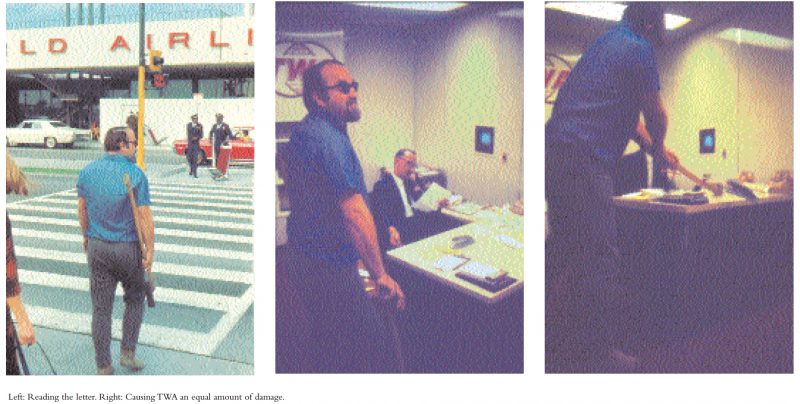
LW: I can see this story coming. [Laughter]
EK: Anyway, we parked in the parking lot, and I set out for TWA. And behind me is Lyn, and behind Lyn is Monte, and behind Monte is Bob Bucknam, coming along, going click-click-click, documenting this entourage, you know, marching to the attack. It was really funny. There were two spade porters there, and they were talking. And they glanced up, and they saw me coming in with this ax in my hand, and they both just—you know, the color drained from their faces, if that’s possible. [Laughter] They obviously reacted to me. They saw me coming; and they stopped, and they were alert, you know, frightened or wary. As I walked past them, I said, “Good morning,” and they said, “Good morning,” and they went back to talking. I mean, obviously… Meanwhile, Bob’s going click-click-click, you know
We all go in to the same counter, and there’s a guy doing paperwork of some kind. So I walked in. I stand by the desk. Lyn walked in and sat down on the chair, and Monte walked in and sat down on the chair, and both of them sat there and pretended like they didn’t know me, in a way. And Bob’s standing in the doorway going click-click-click. I go up to the guy, and I say, “Excuse me.” I said,“Here.”And I gave him the letter. It said, “Good morning”—blah-blah-blah—TWA—blahblah-blah—“and so I’m going to cause TWA an equal amount of damage. I’m going to destroy a desk for TWA.” (I chose the desk because it was the first thing I had come upon the first time I’d been rebuffed when I came with the lampshade.) So the guy starts reading this thing, he looks over at me, he goes back to reading, he looks at me, and like the color drains out of his face. He says, “But, but, but, you know, I—wait, you can’t do that.” I said, “Yeah, I can do that.” He said, “Well, that’s against the law.” I said, “Well, okay.” He said, “Well, I want my supervisor here.” I said, “Well, then you should call your supervisor and get him over here because I haven’t got all day, you know; I’ve got things to do.” So he gets on the phone, and he tries to call his supervisor.
Meanwhile, another guy comes through the doorway, like out of the back room, and he sees what’s going on, and he runs back. I walk over to that doorway, and I look and he’s just hanging up the phone. I said, “Excuse me, did you call the police?” He said, very selfrighteously,“You bet I did.” I said, “Okay, swell.” I went back to the first guy, and I said, “Look, I’d like to have your supervisor here, but your cohort in there just called the police, and if the police are coming, I don’t want that they should come for nothing.” So I said, “I want you to just move back out of the way.” And the guy says, “Well, I’m working here.” I said, “You’re not working here today, fella.” I took his papers and his car keys and things and I moved them off the desk and put them on the side. I never touched him, but I just said, you know, with my hand like this, and he was in one of those rolling chairs, you know, so he rolled back against the wall.
I take the sheath off my ax and I judge the overhead swing space. And I was scared shitless. Because when you finally decide that you are going to take the law into your own hands, that’s a really major thing to do. But I was so far, I had bullshitted myself so far into the act that I, you know… So I let fly, and I put a big cuntshaped hole into it, you know, because an ax would make one in a metal desk. So I let fly, and I hit the desk about four or five times on the top and a few times on the side. And this guy was just transfixed against the wall; he just, he’s there and he can’t… In fact, I’ve got it in photographs: it’s all in sequence because Bob is going click-click-click all the time. So I hit it four or five times pretty good. And Monte and Lyn both still don’t know me. I mean, they’re just sitting there with this sort of dazed expression on their faces. This other guy’s just sitting across the room with a dazed expression on his face. And I’m going whack-whack-whack on the desk.
So I stopped, and I sat down, and I tied the sheath back on my ax. I looked around, and I said, “Well, I guess that’s it. I’m going home.” And this guy comes out of the back room again and says, “You’re not going anywhere. You stay…” And I said, “Fella, the mood I’m in right now, you don’t want to talk to me. You want to go back in that room. You want to shut up. You don’t want to say one word to me. I’m just going home.”
So we all file out again. Here’s the two spade porters out front, they’re still talking, and I say, “Hi,” and they say “Hi,” and I walk past them. Back to Brave Brownie. And I got Lyn in the car, and Monte climbs in, and Bob is about to get in, and I put the ax in the back, and I look, and down the aisle of cars comes a policeman and the guy from the back room and another guy and another guy, and they come up. The police (who turned out— he was from Wisconsin, a guy from the country in Wisconsin, and he’s a funny guy)—anyway, he comes up and says, “What went on back there?” I said, “I chopped up a desk for TWA.” He said, “You, ah, you chopped a desk for TWA?” I said, “Yeah.” He said, “What did you chop up the desk for TWA with?” I said, “With my ax.” He said, “Could, could, could I see your ax?” I said, “Of course.” I opened up the car, took it out, and gave it to him. He said, “Could I keep this ax for a little while?” I said, “Sure, if you like.” He said, “Would you mind coming back there with me?” I said, “No, I don’t mind.” So we all trooped back in there.
Well, there’s pandemonium in this office—those two spades have disappeared—and this guy’s got supervisors up the ass. He’s got every official of TWA running around this room, and they’re all trying to get to the phone to call each other. [Laughter] It’s just really funny. So I sit down on the edge of the desk, and they say, “Did you do this?” And I said, “I did that.” And they go on. Somebody comes up and they take my name and address, I give him my name and address, and he puts the piece of paper in his pocket. And then he writes down my name and address again, and he puts it in his other pocket. And they’re reading the letter that I left with TWA that says my name is, and where my address is and all that .Another guy comes up and says, “Do you have a car in the parking lot?” And I said, “Oh, terrific, you’re going to validate my parking.” He says, “No, I’m a policeman.” [Laughter] And it was really funny. So we sat there for a while, and it was just such shit going on, and it was really, really hilarious. Finally I said, “Well, gentlemen, I’m going home.” And they said, “Well, you, you…” I said, “No. I came back here. You asked me to, and I came back. Either now somebody charges me and detains me, or I’m going home.” They had like a huddle and they decided I should go home, but I shouldn’t leave the city. [Laughter]
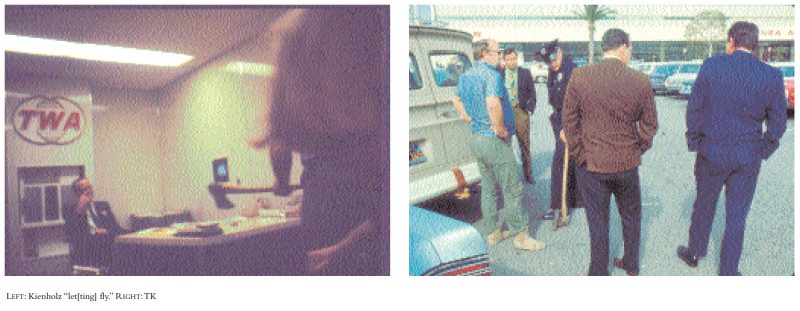
So I went home, and TWA wanted to drop it (they didn’t want the publicity). But the police department, since they had become involved, pressured them to prosecute. So finally TWA prosecuted me for disturbing the peace and public nuisance or something like that. So I went into court, and the defense was very weak because I got on the stand and said, “Yeah, I did it.” My attorney says, “Where does an individual hit a corporation in the nose? If you really get pissed off at a corporation, what do you do?” But I guess you don’t hit them with an ax because the judge said that I was guilty. And it cost me maybe… I guess all told, at the time, say, the fine, and I restored the desk for them—I had to restore the top of the desk and pay the attorneys—it probably cost me $700 or $800.And I would spend that money gladly, just for the whole experience.
I just felt—I always feel frustrated, particularly with airlines, because they’re so goddamn indifferent. They lose stuff for me, and they fuck me over. TWA has screwed me with catalogs coming from Europe. I got a box of dirty clothes one time in lieu of all the catalogs from Amsterdam. And it was just finally too much, you know, and I just wanted to strike back. And I did, and I did it very effectively. It was in the paper, and I was on Jerry Winter’s small program on CBS on Sunday afternoon about this whole thing. (He wanted to know what I had done, and I told the whole story.) It was very funny, and everybody laughed, and everybody very secretly wished that they had done it, you know, because everybody has had trouble with their luggage. I was on radio shows and all this shit. I mean, it was this big thing and went on for a little while. And you know, it takes a lot of “Up, up and away” ads to overcome the humorous, negative publicity TWA got out of that. They would have been a lot better off not to call me a liar. And I went back to court and sued them in small claims court and got paid for the lamp, which is the legal recourse that I had in the first place. I could have done that, and I ultimately did and got paid whatever it was. So, now you owe me a print.
LW: I was going to say that one of the most fascinating footnotes to this story is that this is the origin to the famous “Gerry Nordland” headpiece. [Laughter] Well, let’s see, I guess we’ve just about come full circle.
EK: That’s, uh, printer’s ink.
LW: Does it have to be printer’s ink?
EK: Absolutely. I want it to last.
LW: Does that wash off?
EK: With alcohol it does. Turpentine. [Laughter]
LW: Okay. What do you think of all these last few days of interviewing? What’s it been like for you?
EK: Oh, it’s very frustrating because… As a matter of fact, I’ve already answered that question, I guess, unbeknownst to you. I came out and taped an answer to that question one morning before you showed up.
LW: On the tape recorder? [Laughter]
EK: Sure. Why not? I couldn’t let you get off scot-free, for Christ’s sake. I mean, you came and bugged me for four or five days now.
LW: Where is that? Do I have to wait…?
EK: I don’t know. You’re going to have to find it. It’s in there someplace. [Laughter]
LW: Well, on that note…
EK: No, not on that note, no. I’ll do the reverse on you. What’s it been like to interview me the last four or five days?
LW: That’s fair. Sometimes you were—there were moments you were…
EK: Hostile.
LW: Not hostile, just ornery, I think.
EK: Yeah, that’s a good word.
LW: I felt like anything I would ask wasn’t going to get anywhere.
EK: Yeah.
LW: And then there were points when that kind of hostility melted—it was really like it was melting. It was almost like the stories would enliven you, and they would melt that away. For me, the kinds of things that haven’t been able to be on tape were just the experience of being up here, which has been really remarkable. I mean, a thing which may not come out on tape, one of the most remarkable things, is the way in which your art life, as you said earlier, is just part of what you do. At one point I can find you making coffee or working upstairs on something or helping to build something; and then at another point you’re working on these television pieces and things. And then at still another point, I’ve got you sitting down here, ornery.
EK: At a lot of points.
LW: At a lot of points. The other thing that’s always amazing when you’re interviewing is just the experience of having gone through like forty, fifty years, whatever, you know, just in five days. I’m drained by it, in a way.
EK: Yeah. It’s a frustrating experience because on one level I feel like in being interviewed, that I should have interesting things to say, or it should be accurate, or it should be in proper order or even proper language or whatever because it’s going to be listened to and worked over by other people at a later time. It’s like what we’ve done today now goes into the future in an unknown quantity and an unknown quality. And I have no way to anticipate any of this, what we’ve done, into the future. So I’m very edgy about it. And then, on the other hand, it’s the same thing. I’m honestly sitting right here in this chair, so fuck it. So both ways it works. But it’s been frustrating, and I’ve been purposefully cantankerous. I think that’s just part of the fun of it. If it were all serious, I couldn’t take it.
LW: Okay, well, I think that pretty much does it.
EK: HOORAY!

